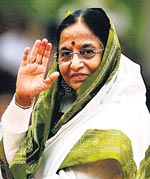
Pratibha Patil: Will India’s new President prove her critics wrong?As Americans debate their readiness to accept a woman such as Hillary Clinton as president, India has already done so, with the election of Pratibha Patil. Although India's presidency is primarily a ceremonial post that carries less weight than that of prime minister (the position once held by Indira Gandhi), it is symbolically significant. Sonia Gandhi, the leader of the ruling Congress Party, who pushed hard to promote Patil's candidacy primarily on gender grounds, calls this election "a special moment for women across the country."
Moreover, India can claim a great deal of pride in the fact that the last two presidents were from minority populations - one from the lowest of castes (Harijan, formerly referred to as "untouchables"), and another one from the Muslim community. As a daughter of a woman who fought for women's rights during the independence movement and was instrumental in starting one of the first women's institutions in India, I should feel a genuine sense of pride in the election of Patil. But at best I have mixed emotions. Both of India's last two presidents had distinguished themselves in professional careers before being elected - one in the Foreign Service and the other in nuclear physics - and their reputations were above reproach. Patil, on the other hand, is a controversial figure, with questionable qualifications. Most of India's major news outlets highlighted in their coverage of the story charges of corruption and ineptitude. One well-respected publication even called Patil's selection "embarrassing." Women hear over and over that we have to be twice as good as men to be perceived as successful, deserving leaders. Even if we disregard some of the accusations against Patil as baseless, it is hard to imagine a less powerful candidate for the highest ceremonial post in the largest democracy in the world. All the same, I applaud Sonia Gandhi for her commitment to appointing a woman to this important position. In a country full of contradictory attitudes toward women - ranging from the worship of the powerful goddess Durga to the killing of innocent young brides - such gestures can be very powerful.
But gestures cannot be a substitute for real action, or for the hard work that is necessary to empower all Indian women. Indeed, one could argue that such symbolic acts may even create a blind euphoria that obscures the fact that, as a result of less education and lower pay, young females in India continue to have far fewer resources than their male counterparts. While India's president may be only a ceremonial head of state, during periods of political instability - especially in the current age of coalition governments - it is the president who makes crucial decisions about governing parties. Many past presidents have also used the position to throw their intellectual weight behind such important issues as education and India's cultural diversity. So President Patil has large shoes to fill. One can only hope that she will prove her critics wrong. For those women in India who have proven themselves to be effective leaders in all segments of society, it would be wonderful if she can demonstrate early on that she has the intellectual and professional gravitas that befits the position.
|
|| Front
Page | News | Editorial | Columns | Sports | Plus | Financial
Times | International | Mirror | TV
Times | Funday
Times || |
| |
Copyright
2007 Wijeya
Newspapers Ltd.Colombo. Sri Lanka. |

